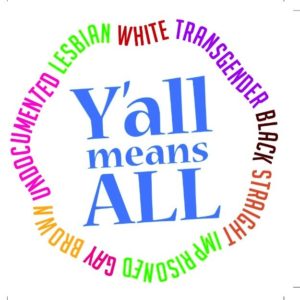I read an article around Mothers Day  about an effort in Philadelphia to raise bail for moms who had been incarcerated for quite a long time just because they were too poor to raise $500 for their bail money. Here they had been sitting in jail for several months, separated from their children, unable to work to support their families, awaiting their trial. These were people who had been accused of crimes, but not tried, convicted or sentenced. Because of this bail out effort, they were released to go be with their children for Mothers Day and await trial while taking care of their families.
about an effort in Philadelphia to raise bail for moms who had been incarcerated for quite a long time just because they were too poor to raise $500 for their bail money. Here they had been sitting in jail for several months, separated from their children, unable to work to support their families, awaiting their trial. These were people who had been accused of crimes, but not tried, convicted or sentenced. Because of this bail out effort, they were released to go be with their children for Mothers Day and await trial while taking care of their families.
As I read through the comments that some people made about the article and the Mothers Day effort, I found myself both sad and angry at the arrogance of these rule of law advocates who thought this crowd funding project was immoral or illegal. Why on God’s good earth would anyone object to that?!
I’m having some conversations with my conservative friend, Janie, about the rule of law. She is not one of the above arrogant complainers (and she cautions me not to judge all Conservatives based on the Internet comments of some. Point taken.)
But I keep asking: where are the other calm, rationale, compassionate Conservatives?
Where is the conservative outcry when police officers overstep the bounds of the law? Police violence has been well documented recently, and violence against our Black and Brown brothers and sisters is rampant.
Where is the conservative outcry when white business owners side step the rule of law in order to hire undocumented workers and then abuse and mistreat them? The trafficking of immigrant women and girls is a huge and ugly shadow side of American life. A recent class action suit even claims tens of thousands of immigrants detained by U.S. Immigration and Customs Enforcement (ICE) are being subjected to a modern day slavery.
It seems all too clear that our society’s persistent, pervasive racism is a factor in their silence.
Liberals also believe in the rule of law; of course we do. We all want to live with appropriate rules that provide order and safety within our society. But progressives see clearly our American penchant for inequity.  Inequality because of race, because of class, because of financial situation… Justice has never truly been blind in this nation. That’s why the liberal critique is so important, because it names that weakness and challenges our nation’s failures to live up to our promises. It names and challenges our lack of grace.
Inequality because of race, because of class, because of financial situation… Justice has never truly been blind in this nation. That’s why the liberal critique is so important, because it names that weakness and challenges our nation’s failures to live up to our promises. It names and challenges our lack of grace.
Law that is not balanced with mercy is not justice.
I hear some of my conservative friends complain because they don’t hear stories about moderate Muslims speaking out against radicals that use the cover of their religion to perpetuate violence. I keep responding to those accusations out of the abundant and easily accessible evidence to the contrary.
But where is the conservative outcry against blatant and violent abuses of the rule of law? Maybe there are conservative voices speaking out and I’m just not hearing very much of it. I challenge my conservative friends to prove me wrong.
If religious liberty is to be a foundational tenet in America, then it must be religious liberty for a ll. If the rule of law is to be a core principle by which we order our society, then it must be applied equitably and compassionately to all. If we say America is about “liberty and justice for all,” then we must make sure that “all means ALL.”
ll. If the rule of law is to be a core principle by which we order our society, then it must be applied equitably and compassionately to all. If we say America is about “liberty and justice for all,” then we must make sure that “all means ALL.”
Charlotte Vaughan Coyle lives in Paris TX and blogs about intersections of faith, culture and politics on her website and Intersections Facebook page.  She is national secretary for Coffee Party USA and contributes regularly to the Join the Coffee Party Movement Facebook page.
She is national secretary for Coffee Party USA and contributes regularly to the Join the Coffee Party Movement Facebook page.
Charlotte is an ordained minister within the Christian Church (Disciples of Christ) and also blogs about Scripture from a progressive Christian approach in her Living in The Story Musings.
In the matter of cash bail, the State of New Jersey adopted a system at the beginning of 2017 which eliminates cash bail in most circumstances. This was neither a conservative nor a liberal issue. The rather conservative Governor of New Jersey (former Republican Presidential Primary candidate Chris Christie) cooperated with the Democratic-controlled State Legislature, and the Judicial Branch through Democrat-appointed Chief Justice Stuart Rabner to get the necessary Constitutional Amendment passed by the voters, legislation implemented by the Legislative Branch, regulations put in place by the Executive Branch, and changes to Rules of Court put into place by the Judicial Branch, to make it work – which it has, for the most part.
This is not a matter of conservative v. liberal; Speaker Prieto is very liberal, and Governor Christie – I daresay most Americans are familiar with him by now. This is a matter of justice; a matter of cooperation; a matter of compromise when necessary; and a matter of major change when necessary.
If you wish to “challenge” conservatives, liberals, progressives, or Cardassians on the subject, you are not trying to accomplish something – you’re simply trying to make political hash at the expense of the people you claim to be advocating for. Your approach to this matter is exactly why the DACA deal fell apart so fast – you are not addressing this as an American first, but rather as a progressive first.
If Chris Christie can put all that aside to cooperate at all levels of government, I ask: why can’t you?
(IANAL, and I do not speak for my employer. You can find out more about NJ’s experience at http://njcourts.gov/courts/criminal/reform.html .)
I appreciate your thoughtful civil response. You misunderstand my point, however. I am not criticizing the criminal justice system in this blog; rather I am pointing out some of the comments that responded to the article about the GoFundMe project to bail out moms for mothers day. Too many of these commenters suggested the bail out project went against the rule of law. This position is in complete contradiction to how the law works in this country. People who can afford bail are out within hours. Poor people accused of the same type of crime too often must remain in jail until trial. This is a gross inequity and compassionate Conservatives ought to be protesting and working together across aisles to remedy this injustice. I applaud the bipartisan effort in New Jersey. Keep speaking out to your fellow Conservatives and encourage compromise and cooperation. I will do the same with my fellow Liberals. Thanks for your comment.
Moderates don’t make good media – too boring.
Extremists – of any extreme and even better if “not of this group” – make for great media.
A legitimate role for the media is to warn of danger – hurricanes are a good example. Real emergencies generate real interest in the media consumer. But since that spike of interest is so pleasurable for the media they try to recreate it as often as possible. “X causes CANCER! are you at risk!” gets more eyeballs than “an un-replicated study suggests the risk of getting cancer (insert body part here) is raised by (insert food or action here) potentially raising the rate from a background occurrence of (say 10) per thousand to (say 15) per thousand. When the background rate is very low (example lung cancer) and the rate of people smoking cigarettes is many times more than background (the factor is about 10 – from roughly 10/100,000 never smoker to roughly 100 per 100,000 smokers) media are justified in using exclamation points. (Non smokers can get lung cancer, smokers can dodge lung cancer — it’s a game of probabilities. )
See? moderation is boring, and long, and nuanced.
We need to understand how pervasively corrupt the cash bail bond system is – and especially how many individuals; of all color and socio/economic class are both victimized and profit from what can only be called systemic extortion. The poor are not simply incarcerated but rendered, perhaps permanently, indebted by a criminal justice system that has lost also a sense of a justice and has grown purely punitive in nature. The marketplace’s reliance on the exploitation of those who enter the criminal justice system can not be understated, and a comprehensive economic impact study would reveal that those who enter the system are not simply indebted, but limited in terms of earning potential by a criminal record that is equivalent to a life sentence, or scarlet letter. The ACLU, the Brennen Center, the MacArthur Foundation, and many, many, many others have made tremendous headway toward reform but because of the economic impact local control of bail bond policy and revenue generation for government entities and the campaign contributions made to elected officials by those individuals and corporate entities that thrive financially on the current system the problem persists and demand for greater more comprehensive change must be invigorated.
One of the things that can be done to quickly address a portion of this problem is to notify all defendants about ‘waiving time’ – a tool used by defense attorneys – which essentially has defendants give up the right to a fair and speedy trial. Other things need to be done as well, for example:
Len Downie Jr, in his 1973 book, Justice Denied (self-published in Great Britain) claims the plea bargain system (which replaced the justice system for poor defendants) began in New York City, shortly after Miranda v. Arizona (384 U.S. 436; 1966). At the time, many attorneys refused to use it, considering it unethical. At first, it was used solely in the most serious cases. However, in 1982 Los Angeles began using it routinely. The conviction rate soared from 81% in 1981 to 98.6% in 1988, falling to only 96% in 1997 when the State of California stopped publishing The California Criminal Justice Profile. It is at least possible that publication stopped due to the letters I sent to various elected and non-elected officials in both Los Angeles and Sacramento.
While Gideon v. Wainwright (372 U.S. 335; 1963) established the right to an attorney for indigent defendants, Miranda expanded when an attorney would be required as well as spawning many concerns such as inadequate funding and training of attorneys, excessive workloads and conflicts of interest. In my book, Liberty and Mental Health – You Can’t Have One Without the Other, I make arguments against Miranda, as well as Frazier v. Cupp (394 U.S. 731; 1969) which permits police to lie to the public just about any time they want, Imbler v. Pachtman (424 U.S. 409; 1976) which encourages malicious prosecutions and Bordenkircher v. Hayes (434 US 357; 1978) which permits the prosecutor to blackmail defendants. The result has been to usher in the procedures used in the Jim Crow South for use in the rest of the nation.
Notes from the Author (pgs. ix – xi) is essentially a synopsis of my involvement with the criminal justice system, while chapter 7 deals with how a U.S. Senator from California was moved by an early work of mine – and the unexpected benefit I received as a result. http://shakugoukaku.com/ has a link to Scapegoats, my comedy about the mental health and criminal justice systems – as well as other works of mine.
“The law perverted! And the police powers of the state perverted along with it! The law, I say, not only turned from its proper purpose but made to follow an entirely contrary purpose! The law become the weapon of every kind of greed! Instead of checking crime, the law itself guilty of the evils it is supposed to punish! If this is true, it is a serious fact, and moral duty requires me to call the attention of my fellow-citizens to it. ” (The Law by Claude Frédéric Bastiat Preface © 1850)
As a rule, conservatives don’t “outcry”. It doesn’t seem to be in the nature. Liberals, progressives, socialist, seem to feel empowered by their actions. Conservatives are vastly more likely to discuss among ourselves the disappointment in humanity over the latest issue. There are some who gather, but most prefer to believe that the bad incident was isolated. They don’t commit that infraction, and believe it’s wrong. But public outcry isn’t deemed message to solve the problem.
It may also come from the base of self sufficiency verses a need for a collective.
If conservatives don’t outcry, then what was the public reaction to the Hobby Lobby decision, to the Chik-Fil-A controversy, …?
Assuming “self-sufficiency” to be a conservative trait that liberals don’t share is yet another example of bias in your comment.
Hobby Lobby, a company outraged by having to provide contraceptive coverage for birth control for employees, was recently fined $3 million dollars for buying Iraqui artifacts. Nobody is talking about how these artifacts were acquired. The most likely source is from ISIS, either directly or indirectly. Hobby Lobby is hypocritical.
I don’t think Charlotte meant “mass protest” by “outcry.” She referred to the hundreds of articles, books and interviews by moderate Muslims condemning violent extremists. Conservatives write books and articles and give interviews. But when extremist conservatives commit violent acts, I never see books, articles or interviews condemning violent right-wing extremism. It’s not that Conservatives think of violent acts as isolated, because when there’s a violent act by a Muslim or individual left-wing extremist, they are all over the media talking about how this shows that Islam is violent and the left is rioting. Self-sufficiency doesn’t explain this. And anyway, we just finished 8 years of constant outcry about every breath Obama took.